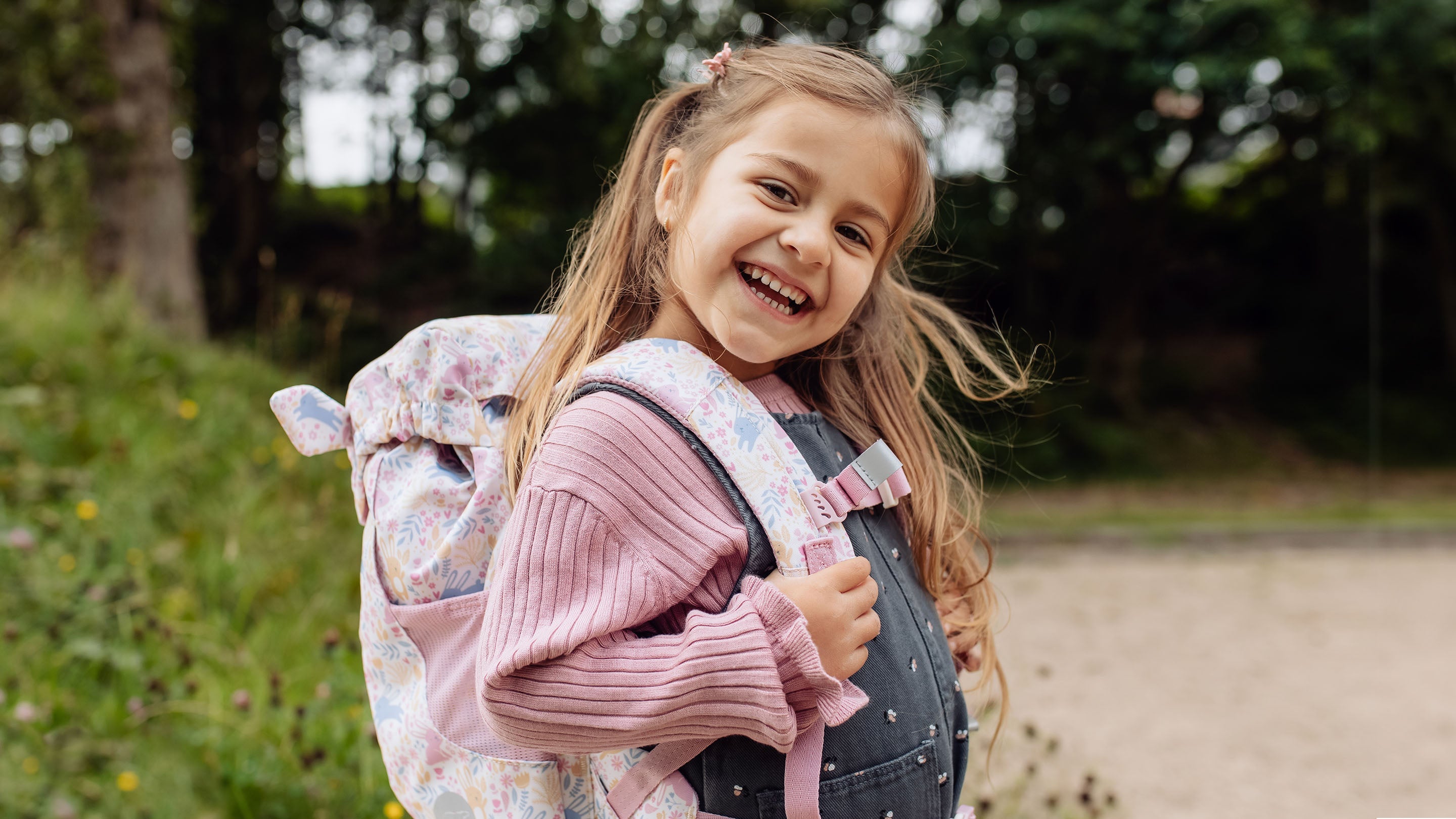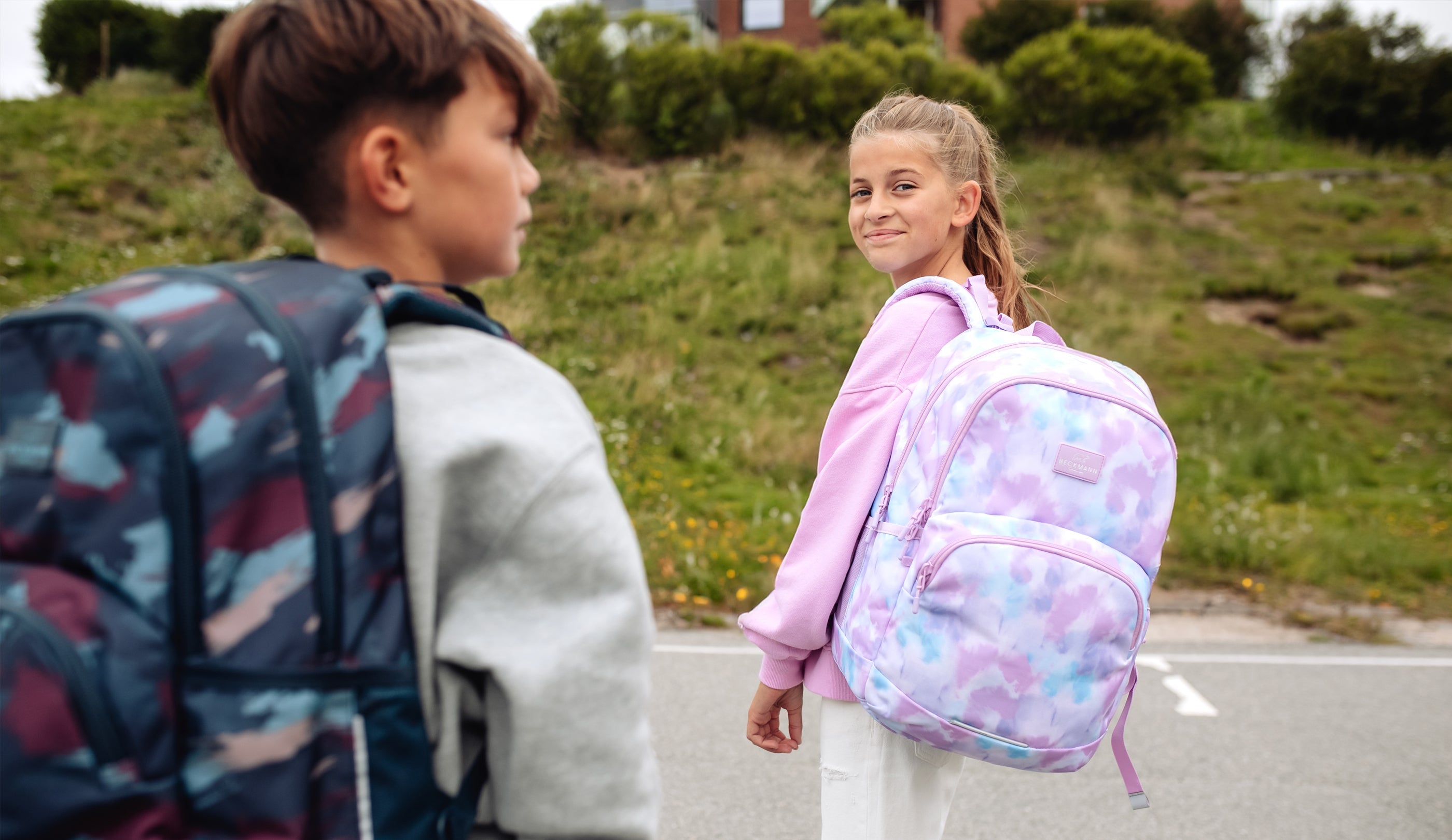Quality and materials
Quality reduces environmental footprint. For Beckmann, sustainability is about developing backpacks that last - in quality, design, and functionality. This is how we work to reduce both resource use and environmental footprint.
With over 75 years of experience, we at Beckmann know what a school backpack is exposed to and must endure. We understand the everyday life of both children and backpacks, and we know that durability and comfort must go hand in hand. Our goal is to create the perfect school backpack!
All our backpacks are produced according to strict quality standards and undergo thorough testing and inspections before ending up on your or your children’s back. That’s why we confidently offer a four-year warranty on our backpacks. And if something should happen, we have spare parts available - so the backpack can be repaired and enjoy a longer life.
Recycled polyester (rPET)
Since 2022, we have gradually introduced recycled polyester into our products. We are proud to say that from 2024, the main material in all our backpacks is recycled polyester made from plastic bottles.
By replacing traditional polyester with rPET, we can reduce CO₂ emissions from the polyester fabric by up to 70%*. This significant reduction is mainly due to the fact that mechanical recycling of PET bottles requires much less energy and results in lower emissions than producing new polyester. It also helps keep plastic in circulation longer and reduces the need for landfill or incineration. * Textile Exchange and UN's" Fashion Industry Charter for Climate Action
Our commitment to rPET is part of our ongoing efforts to reduce our environmental footprint – and to support a more and responsible textile industry.

Global Recycled Standard (GRS)
The rPET material we use is certified according to the Global Recycled Standard (GRS) - an international certification that confirms the material is genuinely recycled and that production is carried out responsibly. GRS sets requirements for traceability, chemical management, working conditions, and environmental impact throughout the value chain.

FSC® Certified – Responsible and Sustainable
The pencils in our pencil cases are FSC® certified, meaning the wood comes from forests that are managed in a way that protects wildlife, biodiversity, and the climate – while also maintaining the forest’s ability for natural regeneration. The same applies to the paper used in our printed marketing materials.
Chemicals

Chemicals are present in most modern materials. Therefore, it is essential that chemical use is controlled, tested, and kept within the applicable legal limits. We strive to deliver high-quality products that comply with current legal requirements and recognized practices for chemical safety.
Before starting new production runs, we conduct physical and chemical tests to ensure that the materials meet our chemical requirements. These requirements are based on leading regulations, including the EU’s REACH and POPs regulations, as well as U.S. laws such as CPSIA and state-specific requirements like California Proposition 65.
REACH is the EU’s chemical legislation that regulates the use of chemical substances in products to protect health and the environment. Similarly, CPSIA and Proposition 65 set consumer safety requirements in the U.S., particularly for products intended for children and everyday use.
For products intended for children in kindergarten and the first school years (grades 1–3), we test according to EN 71-3, the Toy Safety Directive. This standard helps ensure that materials do not release harmful heavy metals during normal use.
Our lunch boxes are made of PP plastic, a durable and food-safe material. The drinking bottles are made of Tritan plastic, known for its clarity, durability, and food safety. These products are tested in accordance with EU Regulation 10/2011 and 2020/1245, which govern materials in contact with food. Our lunch boxes and bottles are BPA-free.
At Beckmann, we work systematically to comply with chemical legislation and our own chemical requirements. This includes continuous monitoring of regulations, close collaboration with suppliers to obtain updated material information, and maintaining our restricted substances list covering substances such as phthalates, PFAS, BPA, and heavy metals. We also perform regular chemical analyses to ensure that products meet applicable requirements before they are made available on the market. If analyses reveal deviations, we follow up and implement corrective actions.

OEKO-TEX® STANDARD 100 – Safe Textile Materials
Our textile materials are certified according to OEKO-TEX® STANDARD 100, meaning they have been tested for over 100 harmful substances and chemicals. The certification ensures that the materials are safe for both children and adults, and meet strict international standards for health and safety.
Collaboration
To ensure that our products meet the highest standards, we collaborate with renowned testing and research institutions such as RISE and Intertek. Together, we ensure that every product maintains quality, safety, and environmental responsibility – for your benefit and for nature.
 RISE - a leading research institute that helps us stay ahead when it comes to chemicals and environmental impact. A global expert in quality assurance that conducts thorough inspections and tests to ensure top-class quality.
RISE - a leading research institute that helps us stay ahead when it comes to chemicals and environmental impact. A global expert in quality assurance that conducts thorough inspections and tests to ensure top-class quality.


